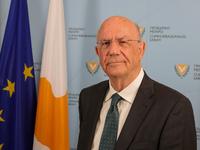Press Releases

02-11-2018 18:42
Address by the Minister of Interior at Economist’s 14th Cyprus Summit
What is going on in Europe? And where is this unique project called EU heading to?
I believe it is not about reconciliating North and South. That was perhaps the case in the past, with rivalries between North and South European Countries on issues like the EU or the budget, the common agricultural policy or different approaches on European integration.
In my opinion things now are far more serious: The current turmoil in Europe covers an unprecedently broad array of serious issues:
Migration and the refugee crisis, terrorism and religious radicalisation, political radicalisation, internal security, the Greek crisis, the Eurozone crisis, the ongoing conflicts in our unstable neighbourhood e.g. in Syria and the Middle east, Ukraine, and the role – if any – of the EU in these conflicts. All these issues generate serious political tensions between many different Member States and pose a threat to the very existence of the EU.
So what Europe needs is to rediscover and reposition itself, which is far more serious and far more difficult than in any period in the past.
How does the EU deepen or solve the existing crises? Is there really any coherent pattern of values among the population across the 28 European member states of the EU?
Europe needs to answer the questions it hasn’t answered yet if it wants to survive. And when I say Europe, I do not mean just Brussels or Institutions. I mean the Member States and their populations, and this is a very clear and important distinction for future success. If the chasm between the official policies in Brussels and the populations of the Member States prevails, as it has in many topics, Europe will lose.
I would divide the three main pillars upon which the future of Europe depends as follows:
- What is the socioeconomic direction of the EU? What is its stance on the euro, the internal market and the welfare state? The EU is not what it started to be. The founding fathers’ vision was to unite Europe through voluntary trade, creating economic ties and interdependencies. It was about the four freedoms and abolishing borders. It was not about more bureaucracy in the name of integration, it was not about abolishing the nation state, it was not about over-centralization and over-regulation, and it was not about Funds or a supranational Keynesian economic model. Was it perhaps that turn in direction which contributed to the creation of a number of failed economic policies and is currently a source of rivalry and conflict between member states? Because one won’t find much enthusiasm for Europe in countries that have experienced what they considered to be failed EU economic policies and where people are unemployed.
- What is Europe’s position on internal security, migration, refugees and diversity? What is Europe’s relation with the position of migrants in European societies? It is the same as it was 20 years ago when the character of migration was different? What is Europe’s relation with religious radicalization? When approaches to religion change, these have to be taken into consideration in policy formulation. We need to take people’s concerns seriously, especially those involving questions of internal and external security. Europe’s failure to respond to this question has resulted in raising borders in Europe for the first time since the Treaty of Rome, threatening the very existence of the European Project. Not in my words, but in the words of all three Heads of the three main European Institutions.
- What are the geopolitical relations with Turkey, Russia and Syria? Does the EU have an external dimension whatsoever, even after creating special institutions for external policy? Unfortunately, it has not yet defined its relations with Russia and Turkey, while it is absent as a big player in the Syrian Crisis – a crisis which threatens the EU directly through the refugee crisis.
If the EU is to survive, it has to offer answers to the “taboo” questions that threaten its very existence. In the absence of Europe repositioning itself on those topics, extremists of various ilks challenge the mainstream political elite by providing their own answers and put in jeopardy the European Project itself.
We all have our own views on what these answers can be. But we have to address them, if the European Project is to survive. If we do, we will give Europe prospects for a shared future once again. And a shared future of peace and prosperity can not be possible with those who see the retreat to the nation state as the solution to absolutely everything. It is against those populists that we have to redefine and defend our common basis of values.
We, here in Cyprus, owe a lot to Europe, as of course do most of the European countries. We owe our security to being a part of the big European family. We owe our prosperity to open borders and trade. And neither our security or prosperity can be guaranteed if we live in a Europe and a world of isolation, protectionism and populism.
(GA/II)
Relevant Press Releases



18-11-2024 14:15
Price Index of Construction Materials: October 2024

15-11-2024 15:12
Road Freight Transport: 2nd Quarter 2024

14-11-2024 13:52
GDP Growth Rate: 3rd quarter 2024 (Flash Estimate)


